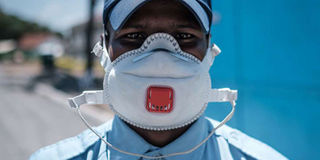Suspected coronavirus? Take these steps

A security officer wearing a protective face mask poses for a picture at the entrance of the Infectious Disease Unit of Kenyatta National Hospital in Nairobi, Kenya, on March 15, 2020. PHOTO | YASUYOSHI CHIBA | AFP
What you need to know:
- Here are the steps you need to take when you suspect that you have the virus.
With three confirmed cases of the new coronavirus (Covid-19), Kenyans are on high alert as they seek to learn as much as they can about the disease.
It is important to know the exact steps to take when you suspect that you or a family member has the virus.
Symptoms can range from mild illness to pneumonia. Some people will recover easily, while others may get very sick very quickly.
Here are the steps you need to take when you suspect that you have the virus:
Know the symptoms
The most common symptoms of the virus include fever, a dry cough, tiredness or exhaustion, headache and shortness of breath.
These symptoms, which start within 14 days of initial infection, primarily distinguish the novel virus from other influenzas such as the common cold.
If you have the above symptoms, you should:
1. Call the Covid-19 hotline number
The Ministry of Health has provided hotline numbers that you can call if you suspect that you or a family member or a friend has the virus.
Those with symptoms should either visit the nearest health facility or contact emergency teams through the numbers 0729471414 and 0732353535.
When you call these numbers or while speaking to the doctor, you will need to explain your symptoms, your travel history and the persons you have been in close contact with.
It is very important to be honest so as to help you get better as well as monitor other loved ones or people you might have come into contact with.
If you have not yet started to present all symptoms and just have a cough or a fever, it is crucial that you self-quarantine in your home to avoid possible spread to other people.
It is also important to avoid other family members within your household as much as you can if you start showing certain symptoms. As the disease progresses with time, more symptoms may show.
2. Self-quarantine
After making the call to the Ministry of Health hotline or your doctor, they may advise you to stay put as they come for you.
This move is meant to prevent passing the virus on to other people such as the taxi driver or another family member.
Here is what you need to do:
• Stay at home. If you have mild symptoms of the Covid-19, you should stay where you are and restrict your movements or activities at home.
• Wear a mask if you are in the presence of others at home or in a room or vehicle.
• Monitor your symptoms such as temperature and difficulties in breathing.
• Cover your coughs and sneezes and dispose of used tissues in a lined bin.
Wash your hands immediately with soap and clean water for at least 20 seconds or sanitise your hands with an alcohol-based hand sanitiser.
• Avoid public areas such as church, school and restaurants. You should also avoid public transportation such as matatus and taxis.
• Stay away from other people, not only in public places but also at your home. If you live in a crowded home, try seclude yourself as much as you can.
• Limit contact with pets and other animals and only interact with them while wearing a mask.
• Avoid sharing personal household items such as dishes, drinking glasses or cups, towels or bedding with other people.
• Clean high-touch surfaces with disinfectant.
3. Getting tested.
Depending on your symptoms, your doctor or the healthcare provider will tell you if you should be tested or not.
They will arrange the test for you in collaboration with the Ministry of Health officials.
The doctor will determine the need for a test based on the following:
• If you have returned from overseas in the past 14 days and developed respiratory illness with or without fever
• If you have been in close contact with a confirmed Covid-19 case in the past 14 days
• If you have severe community-acquired pneumonia and there is no clear cause
• If you are a healthcare worker who works directly with patients and you have a respiratory illness and fever
4. After the medical test
It might take a few days or hours before you get your results. Depending on the severity of your symptoms, you may be kept in an isolation ward at the hospital.
If the doctor allows you to go home, you should self-quarantine and not go to any public spaces.
You should also wear a mask and maintain good hygiene.
Staying at home means that you should:
• Not go to work, school and supermarkets
• Ask someone to get food and other necessities for you and leave them at your door
• Not let visitors in unless they live with you
5. Treatment
There is no treatment or vaccine for the Covid-19, but doctors can treat most symptoms such as fever and headaches. Antibiotics do not work on viruses.
6. Prevention
Good hygiene and social distancing is the best way to prevent the virus from spreading. Good hygiene includes:
• Covering your coughs and sneezes with your elbow or a tissue
• Disposing of used tissues properly
• Washing your hands often with soap and water
• Using alcohol-based hand sanitisers
• Cleaning and disinfecting surfaces
• If you are sick, avoid contact with others and stay more than one metre away from people.





